|
To be
clear, Oz the Great and Powerful is not a prequel to
the 1939 classic The Wizard of Oz. It is a precursor
to
the book by L. Frank Baum, "The Wonderful Wizard of Oz". As a
children's
author Baum wrote 14 books about Oz but he never explored the backstory
of the faux-wizard.
It is a
relief to say that director
Sam Raimi (Evil Dead, Spider-Man) has
made an origins film about the wizard, where the world of Oz is not
only
realised in stunning detail but plays host to a richly characterised
anti-hero,
who like the audience, comes to realise the power of illusion.
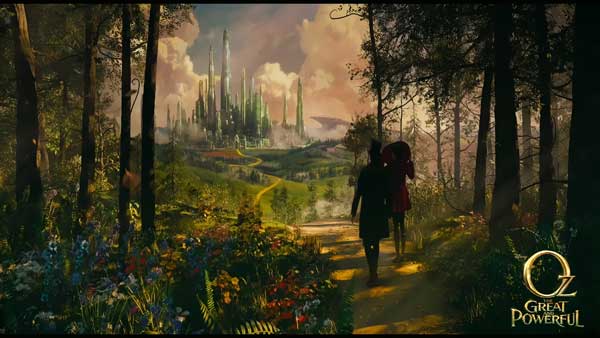
The film
is a technical marvel in 3D
and overcomes many of the format's shortcomings. Filmmaker and author
Lenny
Lipton states that stereoscopic cinema (3D imaging), films with the
added
illusion of depth, is mostly projected using digital projectors and is
what he
calls 'field-sequential'. He argues that illumination is decreased by
fifty
percent because the light is divided between both of our eyes.
Further,
the polarizer filters in
the 3D glasses block the light from the screen so that each eye sees a
different image but the lighting is dimmed. A footlambert (fl) is the
unit of
measurement for illumination and film critic Roger Ebert believes
regular film
projection offers 15fLs, whereas 3D films only display between three
and six
foot-lamberts.
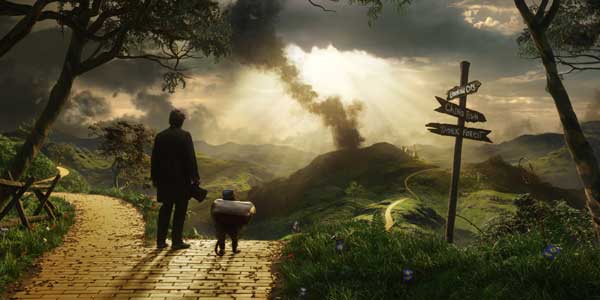
The art
design Oz has been meticulously planned to address
these issues by
brightening the screen and reducing the gloom. Primary colours are
well-chosen
and employed spectacularly, showcasing plants and vegetation by using
red,
yellow and green palettes that saturate the frames with colour and
light. The
widescreen ratio also combines effortlessly with Raimi's formal control
to
showcase these sumptuous features.
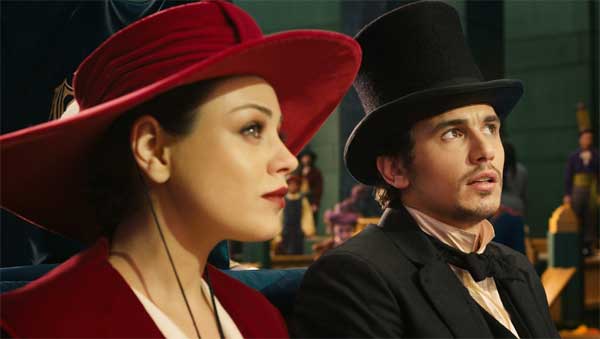
Watch as
the camera crabs sideways
while Oz walks with his friends down the yellow brick road. The
fluidity of the
camera as it drifts across the frame accentuates the spatial width and
depth of
the world and provides us with enough time to absorb many of these
visual
treats. Together, the high contrast lighting effects and 3D depths make
this an
incredibly beautiful film.
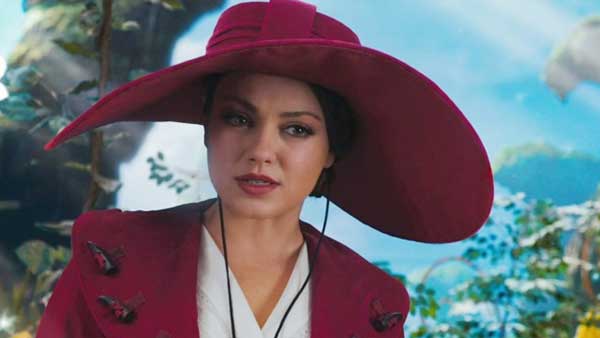
Not
all the scenes are shot in
colour though. The opening scenes in Kansas, 1905, are photographed in
black
and white and use a 4:39 box ratio, like the 39 film. These scenes are
valuable, establishing Oz's personality as a magician who treats the
people
around him like they are props in a trick. He lies to women, giving
several of
them the same music box, and he sees no reason to befriend his
assistant Frank (Zach Braff). He doesn't even deem himself as worthy
enough to be with Annie (Michelle
Williams) either.
Chased by
an unhappy strongman, he
jumps into a hot air balloon, unaware of the tornado that will whisk
him away
to Oz. One of the first people that Oz meets is Theodora (Mila Kunis),
a timid
and brittle witch, who falls in love with him, telling him that he is a
great
wizard. As she leads him to Emerald
City, they meet a talking monkey Finley (voiced by Zac Braff), who
accompanies
them.
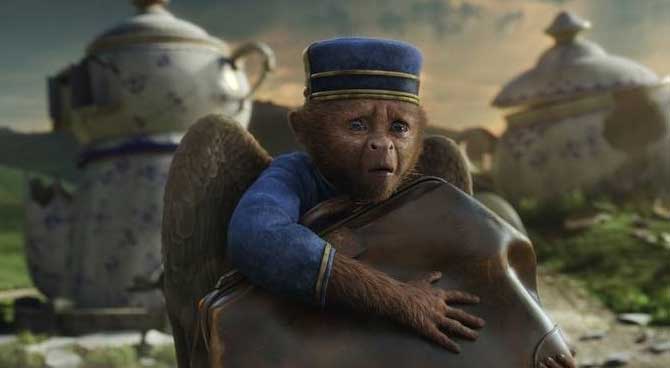
Arriving
at the city, Oz is
introduced to Theodora's sister Evanora (Rachel Weisz), who stresses
he'll have
all the riches he wants once he defeats the white witch Glinda
(Michelle
Williams again). Oz travels with Finley to find her and they discover a
pintsized
China Girl (voiced by Joey King), who needs repairing and insists on
joining
them.
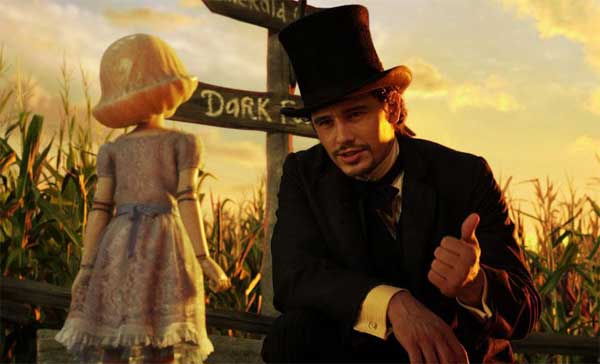
The film
balances precariously on James
Franco's performance and his expressive face punctuates every lie and
self-serving opportunity of the wizard. Enlivened by Franco's
infectious and
cheeky comic energy, Oz becomes an unlikely and funny anti-hero,
weaseling his
way through situations but learning to utilise his powers of deception
in clever
ways, without drastically changing his personality.
Baum
always believed in empowered
women and the three witches each feel distinctive in their presence on
screen.
They're great examples of how efficiently women can be used in modern
blockbusters. Michelle Williams, with her face never short of
emotion,
brings gentleness and sincerity to Glinda, even when she becomes aware
of the
deception around her.
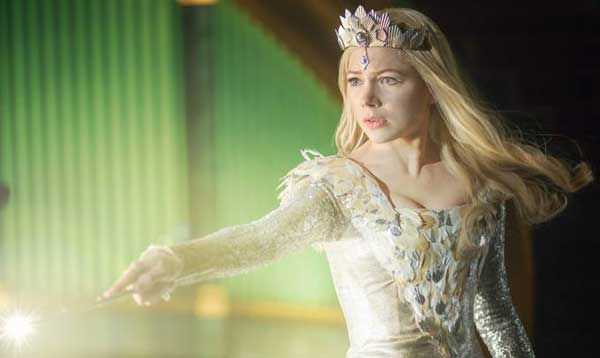
Many
scenes in the film are
accompanied by the power of deception, lies and illumination. Since
Baum was
against violent resolutions, the battles in this film are unique in
their
tactics of trickery. The people of Quadling Country can't kill so
there's a
clever visual scene where scarecrows are dollied across an open field
to draw
out an army of winged monkeys into a bloodless trap.
Additionally,
a projector Oz uses
late in the film echoes the very formal features of cinema used to
create this
extraordinary and beautiful world. Though the film concludes without a
bookend
to determine whether the Land of Oz is real or a dream, the magic has
you
believing for this long that it's best not to question the sleight of
hand.
|